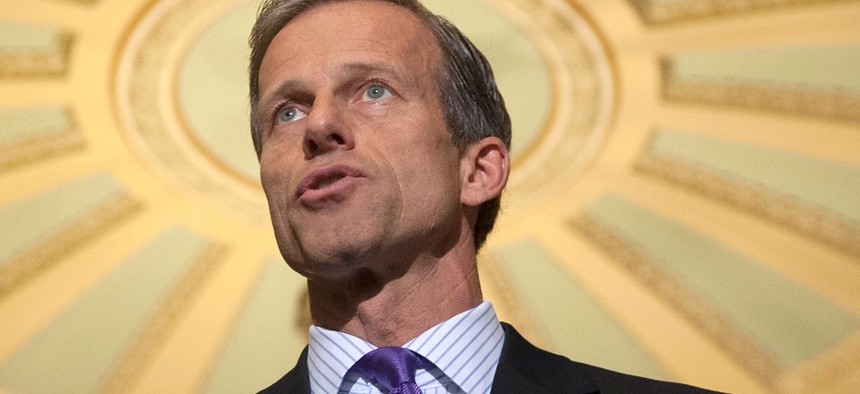This Is the Republicans’ New Plan for Net Neutrality

Sen. John Thune, R-S.D. Cliff Owen/AP File Photo
Republicans look to curb agency's power to regulate the Internet.
Commerce Committee Chairman John Thune has a strategy for stopping federal regulators from seizing broad powers over the Internet: Give them what they want.
Thune is working on legislation that would direct the Federal Communications Commission to protect net neutrality—the principle that all Internet traffic should be treated equally.
But the proposal comes with strings attached—Thune and other Republicans want to use a net-neutrality bill to curb the FCC's overall power to regulate the Internet.
"Congress … is the only entity that can settle this issue with true certainty," Thune said in a speech this month at Reboot Congress, a libertarian technology conference. "And we can do so in a way that will empower the FCC with the strong tools many believe are needed to protect the Internet while simultaneously ensuring the agency is appropriately limited in its reach and authority."
Republicans have long been fiercely opposed to net-neutrality regulations. Sen. Ted Cruz memorably referred to it as "Obamacare for the Internet." But Thune and other GOP members are ready to give in on net neutrality if they can avert what they see as more-onerous regulations.
Their gambit comes as the FCC is on the verge of redefining how it regulates the Internet. On Thursday, the FCC is scheduled to vote on net-neutrality rules that would declare the Internet a "telecommunications service" under Title II of the Communications Act.
That move, according to Internet activists, is the only way the FCC can enact net-neutrality protections that can hold up in court. The FCC has long used Title II, which was enacted in 1934, to regulate landline phone companies.
President Obama endorsed the option in November, urging the FCC to enact the "strongest possible" net-neutrality rules. "This is a basic acknowledgment of the services ISPs provide to American homes and businesses, and the straightforward obligations necessary to ensure the network works for everyone—not just one or two companies," Obama said at the time.
But Republicans say the agency is about to crush Internet service providers with outdated regulations, ultimately leading to higher prices and slower speeds for consumers.
Title II would give the FCC broader authority for net neutrality, but it also includes other powers such as price controls. FCC Chairman Tom Wheeler has said he would waive many of those provisions, but that's been little comfort to the broadband providers that believe they are essentially about to be turned into public utilities.
Thune's bill would bar Internet providers from blocking online content, slowing down traffic, or offering any pay-for-priority deals. But it also would stop the FCC from classifying Internet service under Title II and would gut another legal provision that the FCC has used for authority over the Internet.
Thune is cowriting the compromise legislation with his Republican colleagues in the House—Energy and Commerce Committee Chairman Fred Upton and Communications Subcommittee Chairman Greg Walden. Thune released a draft last month and has said he'll resume discussions in March.
"If we continue to be bystanders while the FCC moves forward, we will be guaranteeing years of legal and regulatory uncertainty that will chill both innovation and investment," Thune said at the Reboot Congress event. "Congress must reassert our constitutional prerogative to make policy, because the only way to protect the open Internet while preserving the bipartisan light touch regime is to find a bipartisan legislative solution."
Thune has acknowledged that he will need Democratic support if he is to have any hope of getting his bill into law. But so far, he hasn't gotten any. Democrats argue that the bill includes loopholes, and they object to what they see as an effort to hamstring the FCC from dealing with other Internet issues that could come up in the future.
Key Democrats—including Sen. Bill Nelson, the ranking member on the Commerce Committee—have indicated that they are open to negotiating with the Republicans after the FCC has enacted its rules.
The Senate and House Commerce Committees held hearings on the draft legislation last month. Thune says he expects to reboot discussions with Democrats in March after the FCC vote.
Chris Lewis, a lobbyist for Public Knowledge, a consumer-advocacy group that supports net neutrality, said that both sides seem to be willing to try to find common ground. But he questioned how far the Republicans will be willing to compromise. "The don't seem to want to have the agency to have the power or flexibility that it's had forever," he said. "That's a problem for us."
Thune argues that his bill addresses the concerns that the Democrats have raised, such as providers blocking or throttling online content.
Some Democrats may feel they have little reason to compromise because they are on the verge of a major victory. But that calculus will change if the Title II rules are struck down in court. Major broadband providers have already indicated they plan to sue the FCC over the issue.
In an interview, Thune indicated his door will still be open even if these rules get killed in court.
"Irrespective of what the FCC is doing in this particular circumstance, I think Congress probably hasn't touched this for a long time and needs to provide some direction and some clarity and clear definition about what the rules of the road are going to be going forward," Thune said. "And I think you can do it in a way that maintains that light touch approach that has been so successful."






